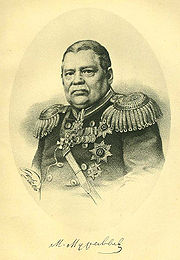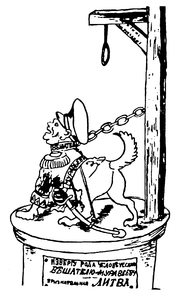
Mikhail Nikolayevich Muravyov-Vilensky
Encyclopedia

Mikhail Nikolayevich Muravyov
Count Mikhail Nikolayevich Muravyov was a Russian statesman who advocated transferring the attention of Russian foreign policy from Europe to the Far East...
, who served as Russian Foreign Minister between 1897 and 1900.
Early years
During his years at the University of Moscow, Muravyov set up the Mathematical Society, of which he would later become president. He volunteered during the Patriotic War of 1812 and was wounded at BorodinoBattle of Borodino
The Battle of Borodino , fought on September 7, 1812, was the largest and bloodiest single-day action of the French invasion of Russia and all Napoleonic Wars, involving more than 250,000 troops and resulting in at least 70,000 casualties...
. In 1816 he became a co-founder of the first Decembrist societies and, although he didn't actively participate in the movement after 1820, he was briefly apprehended by the police after their failed uprising in December, 1825.
Upon the intercession of his high-placed relatives, Muravyov was appointed Vice-Governor of Vitebsk
Vitebsk
Vitebsk, also known as Viciebsk or Vitsyebsk , is a city in Belarus, near the border with Russia. The capital of the Vitebsk Oblast, in 2004 it had 342,381 inhabitants, making it the country's fourth largest city...
(1826) and Governor of Mogilyov (1828). At these posts, he became known for his harsh policy of Russification. He instituted a complete ban on Latin alphabet
Lithuanian press ban
The Lithuanian press ban was a ban on all Lithuanian language publications printed in the Latin alphabet within the Russian Empire, which controlled Lithuania at the time. Lithuanian-language publications that used the Cyrillic alphabet were allowed and even encouraged...
and the Lithuanian language
Lithuanian language
Lithuanian is the official state language of Lithuania and is recognized as one of the official languages of the European Union. There are about 2.96 million native Lithuanian speakers in Lithuania and about 170,000 abroad. Lithuanian is a Baltic language, closely related to Latvian, although they...
printed matter. The ban was lifted only in 1904.
Muravyov's experiences during the November Uprising
November Uprising
The November Uprising , Polish–Russian War 1830–31 also known as the Cadet Revolution, was an armed rebellion in the heartland of partitioned Poland against the Russian Empire. The uprising began on 29 November 1830 in Warsaw when the young Polish officers from the local Army of the Congress...
in 1830 persuaded him that two principal agents responsible for the spread of the Polish nationalism were the Roman Catholic priests and the Polish students. As a consequence, he made it his priority to close the Vilnius University
Vilnius University
Vilnius University is the oldest university in the Baltic states and one of the oldest in Eastern Europe. It is also the largest university in Lithuania....
and to expel Catholic priests from other educational facilities. He was reported as saying that "what Russian rifle did not succeed in doing, will be finished off by Russian schools".
.jpg)
Minsk
- Ecological situation :The ecological situation is monitored by Republican Center of Radioactive and Environmental Control .During 2003–2008 the overall weight of contaminants increased from 186,000 to 247,400 tons. The change of gas as industrial fuel to mazut for financial reasons has worsened...
the following year. In 1850, he was made a member of the State Council of the Russian Empire
State Council of Imperial Russia
The State Council was the supreme state advisory body to the Tsar in Imperial Russia.-18th century:Early Tsars' Councils were small and dealt primarily with the external politics....
. In the 1850s he served as Vice-President of the Russian Geographical Society
Russian Geographical Society
The Russian Geographical Society is a learned society, founded on 6 August 1845 in Saint Petersburg, Russia.-Imperial Geographical Society:Prior to the Russian Revolution of 1917, it was known as the Imperial Russian Geographical Society....
. Alexander II
Alexander II of Russia
Alexander II , also known as Alexander the Liberator was the Emperor of the Russian Empire from 3 March 1855 until his assassination in 1881...
appointed him Minister of State Properties, a position which Muravyov used to lead the reactionary party opposed to the emancipation of the serfs. His administration of state-owned peasant households proved catastrophic and effectively reduced many of them to bankruptcy.
Northwestern Krai Governor General

January Uprising
The January Uprising was an uprising in the former Polish-Lithuanian Commonwealth against the Russian Empire...
of 1863, Muravyov was appointed Governor General of Northwestern Krai
Northwestern Krai
Northwestern Krai was a subdivision of Imperial Russia in the territories of the present day Belarus and Lithuania. Together with the Southwestern Krai it formed the Western Krai...
(former Grand Duchy of Lithuania
Grand Duchy of Lithuania
The Grand Duchy of Lithuania was a European state from the 12th /13th century until 1569 and then as a constituent part of Polish-Lithuanian Commonwealth until 1791 when Constitution of May 3, 1791 abolished it in favor of unitary state. It was founded by the Lithuanians, one of the polytheistic...
, now Lithuania
Lithuania
Lithuania , officially the Republic of Lithuania is a country in Northern Europe, the biggest of the three Baltic states. It is situated along the southeastern shore of the Baltic Sea, whereby to the west lie Sweden and Denmark...
and part of Belarus
Belarus
Belarus , officially the Republic of Belarus, is a landlocked country in Eastern Europe, bordered clockwise by Russia to the northeast, Ukraine to the south, Poland to the west, and Lithuania and Latvia to the northwest. Its capital is Minsk; other major cities include Brest, Grodno , Gomel ,...
). He promptly subdued the rebellion, burning or resettling whole Polish and Lithuanian villages to Siberia
Siberia
Siberia is an extensive region constituting almost all of Northern Asia. Comprising the central and eastern portion of the Russian Federation, it was part of the Soviet Union from its beginning, as its predecessor states, the Tsardom of Russia and the Russian Empire, conquered it during the 16th...
and devolving attendant expenses on the Catholic clergy. About 9000 people were resettled, 127 hanged. Konstanty Kalinowski
Konstanty Kalinowski
Wincenty Konstanty Kalinowski , also known under his Polish and Lithuanian names of Konstanty Kalinowski or and Kostas Kalinauskas; 1838 – March 24, 1864) was a writer, journalist, lawyer and revolutionary...
, Zygmunt Sierakowski and Antanas Mackevičius
Antanas Mackevicius
Antanas Mackevičius – was a Lithuanian priest and one of the initiators and leaders of the 1863 January Uprising in the former Grand Duchy of Lithuania, on the lands of the partitioned Polish-Lithuanian Commonwealth.- Biography :Antanas Mackevičius was born into a family of minor...
were amongst the many local patriots executed on his orders. Those settlements where the rebels were reported had to pay enormous contributions. As a consequence, Muravyov became known as the "hangman of Vilnius
Vilnius
Vilnius is the capital of Lithuania, and its largest city, with a population of 560,190 as of 2010. It is the seat of the Vilnius city municipality and of the Vilnius district municipality. It is also the capital of Vilnius County...
" for Lithuanians, Belarusians and Poles; even in modern Polish historiography he is sometimes referred to by his contemporary nickname, 'Wieszatiel' (russified Polish for 'hangmen'). To many nationally minded Russians, who resented Alexander II's refusal to fully support the nationalist cause, Muravyov was a hero and the de facto head of the "Russian Party". They flooded Muravyov with congratulatory telegrams on his nameday, November 8, 1863, a form of public expression previously unknown in Russia .
On May 1, 1865 Muravyov was relieved from his duties. For his vital services to the Empire, he received a comital title and spent late 1865 and early 1866 writing his memoirs. At the time of his death Muravyov was investigating Dmitry Karakozov
Dmitry Karakozov
Dmitry Vladimirovich Karakozov was the first Russian revolutionary to make an attempt on the life of a tsar.Karakozov was born in the family of a minor nobleman in Kostroma...
's attempt to assassinate the tsar.
Contemporary reactions
In the long term, Muravyov's policy proved mixed. In 1905 Polish rebellion once again took place against Russian Empire. He was however instrumental in rooting out Roman Catholicism in Belarus, prohibiting construction of new churches and converting the existing ones to Eastern Orthodox chapels. Muravyov justified his russification policies by claiming that Polish and Lithuanian administration undertook polonizationPolonization
Polonization was the acquisition or imposition of elements of Polish culture, in particular, Polish language, as experienced in some historic periods by non-Polish populations of territories controlled or substantially influenced by Poland...
measures.
Assessment of Muravyov's activity by the educated strata of the Russian society varied from enraptured odes by Fyodor Tyutchev
Fyodor Tyutchev
Fyodor Ivanovich Tyutchev is generally considered the last of three great Romantic poets of Russia, following Alexander Pushkin and Mikhail Lermontov.- Life :...
to caustic satires by Nikolai Nekrasov. After the suppression of the 1863 uprising, the celebrated emigre writer Alexander Herzen
Alexander Herzen
Aleksandr Ivanovich Herzen was a Russian pro-Western writer and thinker known as the "father of Russian socialism", and one of the main fathers of agrarian populism...
, whose influence on the Russian public opinion had been fatally damaged by his support for the rebels, bitterly joked that Muravyov should replace Alexander II on the throne as a more consistent and forceful nationalist. In Poland
Poland
Poland , officially the Republic of Poland , is a country in Central Europe bordered by Germany to the west; the Czech Republic and Slovakia to the south; Ukraine, Belarus and Lithuania to the east; and the Baltic Sea and Kaliningrad Oblast, a Russian exclave, to the north...
and Lithuania
Lithuania
Lithuania , officially the Republic of Lithuania is a country in Northern Europe, the biggest of the three Baltic states. It is situated along the southeastern shore of the Baltic Sea, whereby to the west lie Sweden and Denmark...
he has been viewed as a personification of tsarist repression and Russification.

